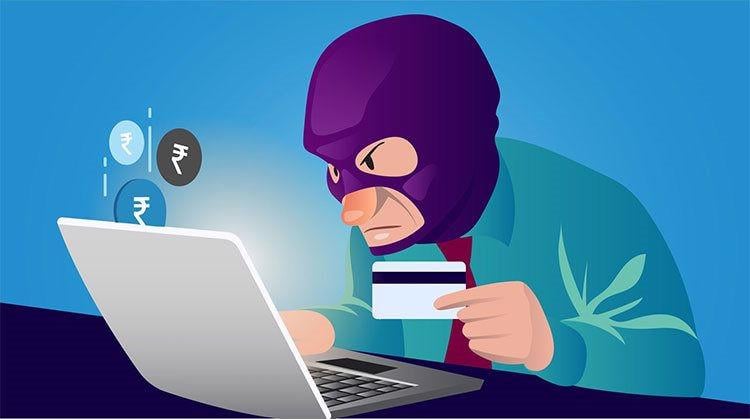Using various methods, the goal of scammers is to appropriate assets by stealing personal information and illegally accessing the victim's bank account.
 |
| Beware of tricks to steal bank accounts. Photo from the internet |
Lots of tricks and schemes
The simplest but most common trick is to paste fake QR codes at payment points, stores, and restaurants. These QR codes lead to fake websites or websites containing malicious code. When users scan the code and follow the instructions, their personal information, devices, or bank accounts can be controlled remotely.
Another more sophisticated form of fraud is sending surprise packages to the victim's home with an invitation to participate in attractive promotions. Recently, Ms. NMH (living in Tuy Hoa City) unexpectedly received a package even though she did not order it. It is worth mentioning that the package included completely accurate recipient information, from name, address to phone number. "Inside there was also an invitation to participate in a promotion with a big reward. To receive it, I had to scan the attached QR code to register my information. Feeling suspicious, I did not follow, because if I scanned the code and accessed a strange link, I would most likely be scammed," said Ms. H.
As for Ms. NTM (residing in Tay Hoa district), the scammers' tricks are different. Ms. M said that a few days ago she suddenly received a series of text messages from a strange phone number, claiming to be from the delivery unit she often uses. The content of the message said that one of her packages was being held due to incorrect recipient information, asking her to quickly access the attached link to update the delivery address, otherwise the package would be returned to the warehouse and a daily storage fee would be charged. Ms. M shared that at first she was a bit worried because she often orders online. But when she checked the official application of the shipping company, she did not see any of her orders being stuck or having such a notification. Feeling something was wrong, she did not click on the link in the message. After that, she called the switchboard and was confirmed that there was no order matching the shipping code sent in the message. This shows that the messages Ms. M received were fake. According to Ms. M, if she had hastily followed the instructions and entered her personal information, she could have become a victim of a scam...
According to authorities, the fact that the scammers have full access to the victims' personal information shows that user data was collected and leaked somewhere before being used to set traps.
In the context of increasingly sophisticated cybercrime, proactively protecting bank accounts and personal information is not only a choice but has become an urgent requirement for every citizen. In addition to the drastic intervention of authorities, people's alertness and safe technology usage habits will be the most effective way to prevent fraud, protect assets and personal data in the digital age.
Nowadays, high-tech criminals are increasingly using sophisticated tricks to steal people's personal information and bank accounts. They often impersonate authorities, asking victims to install malicious applications with interfaces similar to the "National Public Service Portal", thereby taking control of the device and conducting illegal transactions. Another trick is to send fake messages from banks or online service platforms with payment error warnings, requesting information verification via strange links. When users access, personal information and bank accounts can be stolen. In addition, pasting fake QR codes at restaurants, stores or payment points is also a trick used by subjects to spread malware...
Raise awareness
Faced with this situation, authorities recommend that people do not install applications from unknown sources, only download from official stores such as Google Play or App Store. Absolutely do not provide personal information, OTP codes or passwords to strangers via phone or social networks. When users receive strange links, they need to carefully check the domain name.
Mr. Pham Trung Thanh (Technology Department - National Cyber Security Association) recommends: “When receiving a link, we must first check the content and main domain name of the link. The names of large enterprises often start with the character "https", if it is not such characters, it may be a fake domain name".
According to experts, users should also limit the use of public wifi to conduct financial transactions to avoid data theft. If you receive strange calls or messages asking for information, proactively verify with the bank or authorities. Most importantly, everyone needs to be vigilant, proactively protect personal information and immediately report to the police or bank if they detect suspicious signs for timely support.
Source: https://baophuyen.vn/phap-luat/202505/canh-giac-truoc-nhung-chieu-tro-chiem-doat-tai-khoan-ngan-hang-792357b/



![[Photo] Prime Minister Pham Minh Chinh chairs meeting on draft Resolution of National Assembly on International Financial Center in Vietnam](https://vphoto.vietnam.vn/thumb/1200x675/vietnam/resource/IMAGE/2025/5/22/d398664ff1a140629169ea5a24e1b4d0)
![[Photo] General Secretary To Lam chairs a working session with the Central Internal Affairs Commission](https://vphoto.vietnam.vn/thumb/1200x675/vietnam/resource/IMAGE/2025/5/22/3b7790f499da45b2803d8ae253207ef1)

![[Photo] Press delegation meeting to visit Truong Sa and DK1 Platform](https://vphoto.vietnam.vn/thumb/1200x675/vietnam/resource/IMAGE/2025/5/22/6b8d232877ec421a9e8187d83b9f8006)
![[Photo] T&T 1 and Ho Chi Minh City 1 People's Police Teams won the men's and women's team championships](https://vphoto.vietnam.vn/thumb/1200x675/vietnam/resource/IMAGE/2025/5/22/39db06ae67cb4001b7a556e8d9a56d07)


































































![[Podcast] Week introducing more than 500 OCOP products in Hanoi](https://vphoto.vietnam.vn/thumb/402x226/vietnam/resource/IMAGE/2025/5/22/d144aac2416744718388dbae3260e7fd)





Comment (0)